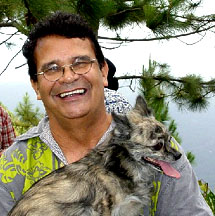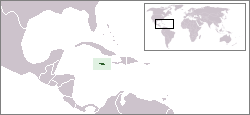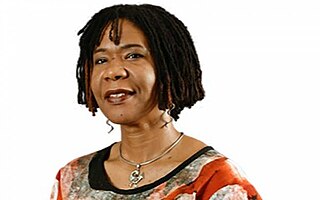The music of Jamaica includes Jamaican folk music and many popular genres, such as mento, ska, rocksteady, reggae, dub music, dancehall, reggae fusion and related styles.
Dancehall is a genre of Jamaican popular music that originated in the late 1970s. Initially, dancehall was a more sparse version of reggae than the roots style, which had dominated much of the 1970s. In the mid-1980s, digital instrumentation became more prevalent, changing the sound considerably, with digital dancehall becoming increasingly characterized by faster rhythms. Key elements of dancehall music include its extensive use of Jamaican Patois rather than Jamaican standard English and a focus on the track instrumentals.

Dub poetry is a form of performance poetry of Jamaican origin, which evolved out of dub music in Kingston, Jamaica, in the 1970s, as well as in London, England, and Toronto, Canada, cities which have large populations of Caribbean immigrants. The term "Dub Poetry" was coined by Dub artist Linton Kwesi Johnson in 1976, and further popularized by artist Oku Onoura, which consists of spoken word over reggae rhythms, originally found on the backing or "version" side of a 12 or 7 inch vinyl record.

O'Neil Bryan, better known by his stage name Elephant Man, is a Jamaican dancehall musician, having formerly been a member of the dancehall group Scare Dem Crew prior to his solo career.

Brian Williamson was a Jamaican gay rights activist who co-founded the Jamaica Forum for Lesbians, All-Sexuals and Gays (J-FLAG). He was known for being one of the earliest openly gay men in Jamaican society and for being one of its best known gay rights activists.

T.O.K. were a dancehall reggae group from Kingston, Jamaica. The group consisted of Alistaire "Alex" McCalla, Roshaun "Bay-C" Clarke, Craig "Craigy T" Thompson, and Xavier "Flexx" Davidson. They started their band in 1996, and announced its dissolution in 2015. T.O.K. were described as "the world's greatest dancehall-reggae boy band" by The New York Times in 2004. They were best known for such hits as "Footprints", "Gal You Ah Lead", "Chi Chi Man", "Eagles Cry", "Guardian Angel", "Money 2 Burn", "She's Hot", "Hey Ladies", "The Voice" and "I Believe".

Lesbian, gay, bisexual, and transgender (LGBT) persons in Jamaica face legal and social issues not experienced by non-LGBT people. Consensual sexual intercourse between same-sex partners is legally punishable by imprisonment.
Stop Murder Music is a campaign to oppose Caribbean artists who produce music with lyrics alleged to glorify murder of homosexual men. The campaign was mainly against Jamaican musicians, primarily dancehall and reggae artists such as Buju Banton, Bounty Killer, and the Bobo Ashanti Rastafarians Sizzla and Capleton.
Kimberly-Ann Robinson-Walcott is a Jamaican poet and editor. She has been the editor-in-chief of the Jamaica Journal since 2004 and editor-in-chief of the Caribbean Quarterly since 2010. Robinson-Walcott is the author of a study of the white Jamaican novelist Anthony Winkler, called Out of Order! (2006).
Gerald Levy, better known as Bogle and also as Bogle Dancer, Mr Bogle, Father Bogle and Mr Wacky, was a Jamaican dancehall star, dancer and choreographer. Beenie Man called Bogle "the greatest dancer of all time" and he is recognised as "part of the foundation and as an icon inside of dancehall culture." Bogle created more dancehall moves than any other figure; he is best known for creating the Bogle dance which is named after him. His stage name, Bogle, is a reference to Paul Bogle a National Hero of Jamaica.
Voicemail is a dancehall reggae fusion duo, hailing from Kingston, Jamaica.
Daggering is a form of dance originating from Jamaica. The dance incorporates the male dancer ramming his crotch area into the female dancer's buttocks, and other forms of frantic movement. Daggering is not a traditional dance; it is of recent origin, associated with the 2006 wave of dancehall music.
The Bogle is a dance move originating from Kingston, Jamaica. The dance gets its name from a dancer named Bogle who danced as part of Kingston's Black Roses crew, who was in turn inspired by Barrington Levy.
"Dem Bow" is a song performed by Jamaican reggae artist Shabba Ranks, produced by Bobby Digital. This song uses the "Ku-Klung-Klung"/"Poco Man Jam" riddim created by Jamaican producers Steely & Clevie in the late 1980s. The lyrics are anti-imperialist and also anti-oral sex, as Ranks compares those who perform sodomy to those who submit to colonialism.

It's All About Dancing: A Jamaican Dance-U-Mentary is a 2006 Jamaican documentary film about dancehall culture. It includes instructional segments about several dance moves that were popular at the time, such as the "Air Force One" or the "Gorilla Warfare".

Blacka Di Danca is a dancer, choreographer, artist, and actor. He has toured and taught workshops in over 40 countries and 100 cities, including South America, Canada, Europe, and Russia. His current business ventures include working on new music, developing marketing campaigns, and producing apparel with his lifestyle brand Danca, digital marketing and creative agency, Danca Media, and music label Danca Music Group.
Kemar Christopher "Ding Dong" Dwaine Ottey is a dancehall reggae artist and dancer. He was a dancer before becoming a Jamaican deejay (artiste) and dancehall reggae recording artist. His most notable songs "Bad Man Forward / Bad Man Pull Up" (2005) "Fling" and "Genna Bounce" released in 2017 has assisted in his global appeal. He founded the dancing syndicate Ravers Clavers.
Dancehall pop is a sub-genre of the Jamaican genre dancehall that originated in the early 2000s. Developing from the sounds of reggae, dancehall pop is characteristically different in its fusion with western pop music and digital music production. Dancehall pop is also different from dancehall in that most songs use lesser Jamaican Patois in lyrics––allowing it to be globally understood and consumed. It also incorporates the key pop music elements of having melodies, hooks, and the verse-chorus format. Additionally, the genre moves away from the reggae and roots reggae music origins in social and political protest, now lyrically centering on partying, dancing, and sexuality.
"Handsfree" is a song recorded by American singer Mya featuring Dancehall recording artist Ding Dong. A "bouncy" riddim song, it was written by songwriter Zan with production courtesy of Jonny Blaze, Stadic, and DJ Perf. As a standalone single, "Handsfree" was released in June 2019 and is one of a handful of tracks featured on producer Jonny Blaze's Sexting Riddim compilation album. Upon release, the song received a positive response from critics and music fans alike. An accompanying music video followed which was produced and filmed in Kingston, Jamaica.

Sonjah Stanley Niaah is a Jamaican scholar, cultural activist, and writer. She is known for her work on dancehall, old and new Black Atlantic performance geographies, ritual, dance, festivals, cultural and creative industries, as well as popular culture and the sacred.







